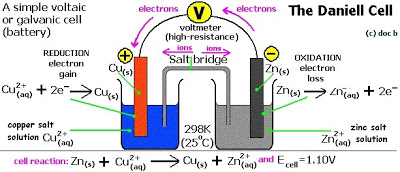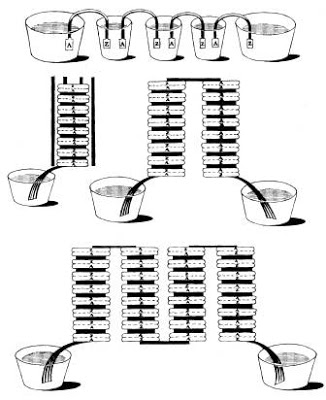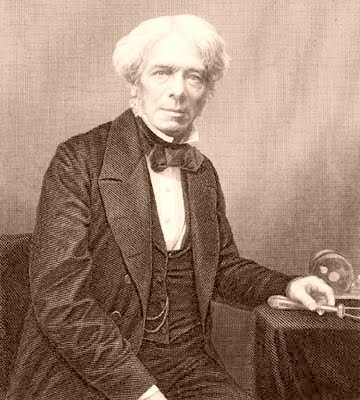Philosophy

 Four variations of Volta’s electric battery.
Four variations of Volta’s electric battery.
 John Frederic Daniell
John Frederic Daniell
March 12th, 1790 to March 13th, 1845
John Frederic Daniell, a 19th-century scientific and academic heavyweight, inventor of the first practical electric battery and all-around geek, is born in London, England.
Daniell, the son of a prominent London attorney, attended prestigious schools in Europe where he excelled in science — especially when it came to performing experiments and building instruments.
After he graduated, he ran a sugar-refining plant where he developed several technical upgrades to the refining process.
The scientific community noticed Daniell after he published several chemistry papers, and he landed a plush job with the newly anointed Continental Gas Company, a British firm dedicated to developing the burgeoning natural-gas lighting industry. His new appointment with Continental would be the 21st-century equivalent of a top job at Tesla Motors.
Daniell developed gas lighting for various French and German cities and figured out a way to generate gas resin from turpentine.
Years later, he invented the dew-point hygrometer (for gauging humidity) and a pyrometer (a device for measuring superhot temperatures). He wrote a series of papers for the Horticultural Society explaining the importance of humidity regulation in greenhouses.
But he’s best known for his contribution to portable electric power and storage. Building on what he learned about chemistry and electricity during his overseas studies and work with Continental, Daniell conceived and built the precursor to the modern-day battery in 1836.
Performing electrical experiments had previously involved mucking around with lightning (dangerous) or using a primitive battery (weak) developed by Italian physicist Alessandro Volta back in 1800. Volta’s battery, also known as a voltaic pile, consisted of stacked metal discs arranged to conduct an electric current. The battery’s juice depleted quickly and was of little practical use.
Daniell’s battery, known as the Daniell cell, lasted much longer. It used copper and zinc electrodes submerged in a solution of copper sulphate and zinc sulphate. When the zinc oxidized, it reacted with a cathode and the copper was reduced. This produced a continuous flow of electric power.
His breakthrough was key to advancing communications technology, in particular, the telegraph.
Daniell later became a high-ranking official at the Royal Society. He worked in academia until his sudden and rather mysterious death in 1845 when he was 55.
John Frederic Daniell [Wikipedia]
Alessandro Volta [Wikipedia]
- Paintable Battery...incredible Technology
Researchers at Rice University have developed a lithium-ion battery that can be painted on virtually any surface. The rechargeable battery consists of spray-painted layers, each representing the components in a traditional battery.In an experiment, nine...
- Short Life...lithium-ion Batteries
"Why lithium-ion batteries die so young" by Josie Garthwaite June 29th, 2011 Reuters The death of a battery: We’ve all seen it happen. In phones, laptops, cameras and now electric cars, the process is painful and — if you’re lucky...
- The Toy Train Man...joshua Lionel Cowen
Joshua Lionel Cowen August 25th, 1880 to September 8th, 1965 Joshua Lionel Cowen was an "American inventor of electric model trains who founded the Lionel Corporation (1901), which became the largest U.S. toy train manufacturer. At age 18, he had invented...
- Conrad Hubert [akiba Horowitz] And The "flashlight"
Conrad Hubert [Akiba Horowitz] April 15th, 1856 to March 12th, 1928 Today is the birthdate of Conrad Hubert [Akiba Horowitz] and a name few have heard and know for a product that every household has stuffed in a kitchen drawer. No, not the can opener...
- "carrot And Stick"...for Energy Alternatives?
The "carrot and stick" methodology has often served global commerce good...money rules. "McCain offers prize for cutting-edge battery" In Fresno, he says he would award $300 million to whoever developed a new device that could efficiently power cars....
Philosophy
Shocking--sort of...improvement of the battery

 Four variations of Volta’s electric battery.
Four variations of Volta’s electric battery. John Frederic Daniell
John Frederic DaniellMarch 12th, 1790 to March 13th, 1845
"March 12, 1790: Batteries Now Included"
by
Daniel Dumas
March 11th, 2010
Wired
by
Daniel Dumas
March 11th, 2010
Wired
John Frederic Daniell, a 19th-century scientific and academic heavyweight, inventor of the first practical electric battery and all-around geek, is born in London, England.
Daniell, the son of a prominent London attorney, attended prestigious schools in Europe where he excelled in science — especially when it came to performing experiments and building instruments.
After he graduated, he ran a sugar-refining plant where he developed several technical upgrades to the refining process.
The scientific community noticed Daniell after he published several chemistry papers, and he landed a plush job with the newly anointed Continental Gas Company, a British firm dedicated to developing the burgeoning natural-gas lighting industry. His new appointment with Continental would be the 21st-century equivalent of a top job at Tesla Motors.
Daniell developed gas lighting for various French and German cities and figured out a way to generate gas resin from turpentine.
Years later, he invented the dew-point hygrometer (for gauging humidity) and a pyrometer (a device for measuring superhot temperatures). He wrote a series of papers for the Horticultural Society explaining the importance of humidity regulation in greenhouses.
But he’s best known for his contribution to portable electric power and storage. Building on what he learned about chemistry and electricity during his overseas studies and work with Continental, Daniell conceived and built the precursor to the modern-day battery in 1836.
Performing electrical experiments had previously involved mucking around with lightning (dangerous) or using a primitive battery (weak) developed by Italian physicist Alessandro Volta back in 1800. Volta’s battery, also known as a voltaic pile, consisted of stacked metal discs arranged to conduct an electric current. The battery’s juice depleted quickly and was of little practical use.
Daniell’s battery, known as the Daniell cell, lasted much longer. It used copper and zinc electrodes submerged in a solution of copper sulphate and zinc sulphate. When the zinc oxidized, it reacted with a cathode and the copper was reduced. This produced a continuous flow of electric power.
His breakthrough was key to advancing communications technology, in particular, the telegraph.
Daniell later became a high-ranking official at the Royal Society. He worked in academia until his sudden and rather mysterious death in 1845 when he was 55.
John Frederic Daniell [Wikipedia]
Alessandro Volta [Wikipedia]
- Paintable Battery...incredible Technology
Researchers at Rice University have developed a lithium-ion battery that can be painted on virtually any surface. The rechargeable battery consists of spray-painted layers, each representing the components in a traditional battery.In an experiment, nine...
- Short Life...lithium-ion Batteries
"Why lithium-ion batteries die so young" by Josie Garthwaite June 29th, 2011 Reuters The death of a battery: We’ve all seen it happen. In phones, laptops, cameras and now electric cars, the process is painful and — if you’re lucky...
- The Toy Train Man...joshua Lionel Cowen
Joshua Lionel Cowen August 25th, 1880 to September 8th, 1965 Joshua Lionel Cowen was an "American inventor of electric model trains who founded the Lionel Corporation (1901), which became the largest U.S. toy train manufacturer. At age 18, he had invented...
- Conrad Hubert [akiba Horowitz] And The "flashlight"
Conrad Hubert [Akiba Horowitz] April 15th, 1856 to March 12th, 1928 Today is the birthdate of Conrad Hubert [Akiba Horowitz] and a name few have heard and know for a product that every household has stuffed in a kitchen drawer. No, not the can opener...
- "carrot And Stick"...for Energy Alternatives?
The "carrot and stick" methodology has often served global commerce good...money rules. "McCain offers prize for cutting-edge battery" In Fresno, he says he would award $300 million to whoever developed a new device that could efficiently power cars....
